#saikyou densetsu kurosawa
Explore tagged Tumblr posts
Text
I fondly remember reading Saikyou Densetsu Kurosawa but I couldn't tell you a single thing about what happened in it.
2 notes
·
View notes
Text

Learning Blender and will start posting my stuff here. Also just finished reading Kurosawa and cried my eyes out so I had to make him here.
1 note
·
View note
Text



related to last reblog, here's ant and the guy she's very loosely based off, kurosawa from saikyou densetsu kurosawa. it's an odd manga that i can't 100% recommend BUT it really really hit when i was a lonely young woman-adjacent thing ok...
#essentially she's him and me#you know how it is#lonely worker ant: supplemental#side note: the end of saikyou densetsu kurosawa hits harder than literally anything else iv ever read#insane for what it is
1 note
·
View note
Text
waiting for saikyou densetsu kurosawa to get any sort of adaptation, be it movie, dorama or anime so i can make an AMV to the sound of Temmarius Matthias-Nagant's 2022 underappreciated banger "Fuwakuwakuwaku"
#also: live action kurosawa with temma playing him#he has the range (and the jawline)#temma matsunaga
4 notes
·
View notes
Text
Thoughts on Saikyou Densetsu Kurosawa
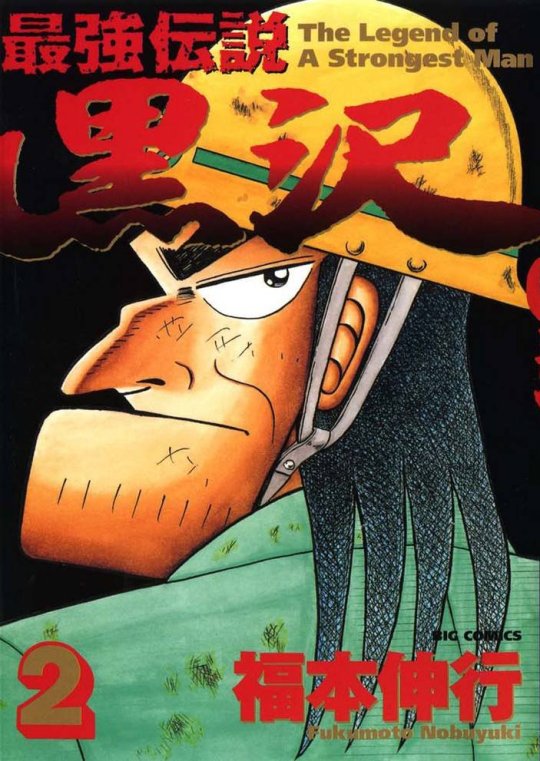
FUKUMOTO Nobuyuki, 11 volumes, published from 2003 to 2006 in Big Comic Original (Seinen)
Saikyou Densetsu Kurosawa (Legend of the strongest man Kurosawa) follows the story of 44 years old construction worker Kurosawa as he realizes he spent most of his life without any meaningful connections with anyone nor any special achievements. He decides to change his life so that he can become proud of his own accomplishments and efforts, and earn respect and appreciation from the people around him.
(spoiler warning)
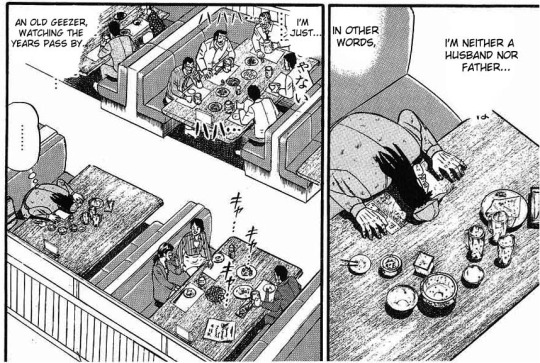
So I’m currently binging Fukumoto manga, after having them on my “plan to read” list for several years…I started with Kaiji, but initially the first manga of his that caught my interest was Kurosawa. The themes of it are right up my alley, and I like main characters that are not teenagers or young adults.
Kurosawa has a sequel, Shin Kurosawa: Saikyou Densetsu, which is a direct continuation. I’ll mostly be focusing on the first part here.

The art is typical Fukumoto style. Odd at first, definitely not the prettiest nor the most impressive out there, but it does the job and I really grew to like it. He doesn’t hesitate to give exaggerated features to his characters, and I actually find the deliberate ugliness of the character designs refreshing. It certainly fits the story of Kurosawa, makes the characters very expressive and works well with the often comedic tone.
Although the art looks simple, Fukumoto can deliver very intense pages when he needs to.
His forte is in his use of narration combined with the picture, rather than in the drawings alone. He is a master at using a narrator’s comments or the character’s thoughts to raise tension and make the manga flow better.
Kurosawa is definitely written with a lot of heart. Both the manga itself and the titular character, feel very genuine. Kurosawa is very flawed and very human. He is rough but powerful, his desires are simple, and he is straightforward in his reactions, to the point that his impulsive nature and lack of social restraints put him in trouble, especially when it comes to women...
There are a few instances however where he comes close to harassing women, which is played for laugh, which I disliked. Those scenes made me less sympathetic towards him as he actually deserved the repercussions of his actions here.
But besides those chapters, Kurosawa is overall a likeable character, easy to sympathize with and to root for as we see him at a low point of his life.
He is clumsy in his interactions with his coworkers, which, coupled with his hot-temper, often leads to misunderstandings and prevents him from getting closer to them despite his best efforts. I actually found Kurosawa’s failed attempts at achieving popularity reminiscent of Watamote. The beginning of both series, in which a pathetic main character fails repetitively at gaining the appreciation of their peers through outlandish strategies, elicits the same mixture of pity, second-hand embarrassment, and amusement.
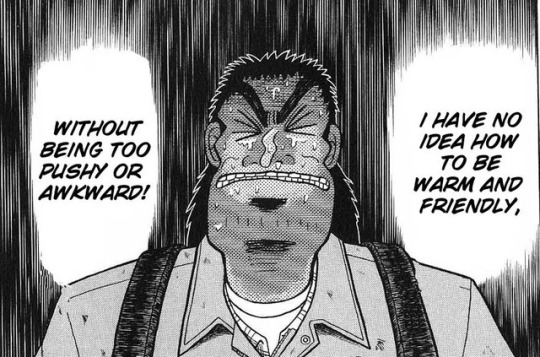
Kurosawa also gets into a fair number of fights. While those fight-focused chapters were not bad, I was personally less into them.
Drawing literal fist-fights in not what Fukumoto’s best at. His character’s postures are somewhat stiff, which he compensates for with heavy use of speed-lines. It is okay-ish, but I want read a fight scene, there’s plenty of fighting manga out there that can do a better job.

I like Fukumoto more when he writes more psychological battles, like in his gambling mangas. Of course, psychological elements and strategies where not totally absent from the fights, but it was nowhere as much as in his gambling manga. Sometimes I think Kurosawa was a bit too lucky in the fights, as he is not a very athletic person nor someone with a lot of experience in fighting. It did not feel very convincing to me.
Besides, it is through these battles that Kurosawa gathers allies, a reputation and respect. But most of his opponents are teenagers, even middle-schoolers ! Granted they are very scary teenagers, but I still fail to see how a 44 years old man throwing hands with teenagers is such a praise worthy thing...
I think I prefer to see Kurosawa fight and struggle to improve his life in a less literal way that actual physical fighting.
I haven’t read that many of Fukumoto’s works yet, but I feel like an important theme in them is perseverance/resilience. He puts his characters through a lot, but they tend to have some form of resistance that shines through as admirable. Kurosawa’s will to fight and to push back against adversity is sometimes the only thing he has left, and it is extremely important.
However, that is not an innate ability that comes to him easily -at times Kurosawa hides, flees, cowers. He hesitates, and he needs to think things through before he actually decides to fight.
Fukumoto: You know how protagonists in shonen manga do things like jump in to stop their classmate from being bullied without thinking about how they might get beaten up themselves? I always felt that wasn’t real. So with Kurosawa, I wanted to make a manga that shows hesitation, and how it actually isn’t so easy to defend people like that.
(Excerpt from this interview)
I like this kind of manga where characters reflect about what is the right decision to take and on how they should be living their life. And how the reader has access to their inner turmoil and thoughts.

His strength is often born from sheer desperation and desire to survive. It is when he is cornered that he can manage to act and fight even when the odds are against him. He has to make do with the very few tools and options he has, which leads him to elaborate unconventional tactics to win over his opponents.
Having cornered underdogs characters winning over more powerful, but less desperate, opponents seems like a running theme in Fukumoto’s manga (cf. the made-up E-card Game from Kaiji, in which The Slave is the only card that can win against The Emperor, precisely because it is so low that it has nothing to lose anymore).
In a way, one could argue Kurosawa follows a formula reminiscent of classic shounen manga: a character who is below average at first rises to a heroic status through willpower, effort and after fighting a string of opponents. However, there are major differences that set Kurosawa apart, besides the older characters and more adult setting (Kurosawa’s worries are grounded in reality: growing old alone, financial problems...) Kurosawa does not provide escapism and dreams. The story begins with Kurosawa as a single old man, and ends with him an even older still single man. He does not become an amazing fighter through power boost and magic training like a shounen character might.
He does want to dream big, but all things considered, his achievements are fairly modest. He is not saving the world or becoming hokage. At most he is just helping some other marginalized people from his neighborhood.
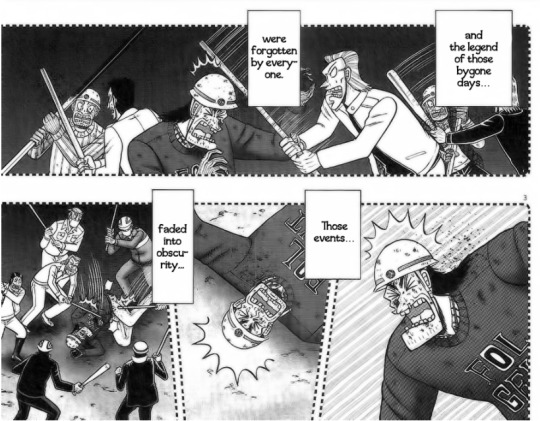
Even if he puts his life on the line to fight, what he accomplished will fade into oblivion at some point.
But, even so, his efforts and struggle are still admirable.
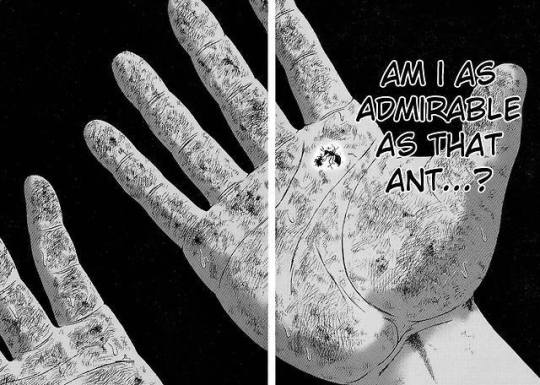
Besides, Kurosawa is not about friendship, at least not the kind of friendship you find in shounen manga.
In Fukumoto’s manga, people may stick together for survival, they can share intense emotions when put through the same ordeals, but it’ll rarely turn into true companionship. Kurosawa is alone from the start, and while he does connect with other people throughout the story, in the sequel those relationships are left behind as he leaves on his own to start a new life.
Fukumoto: My protagonists, on the other hand, are always alone – not only do they not have followers, they don’t even have friends. (laugh) [...] I can’t do manga where the characters readily make friends that they risk their lives for. I started out by drawing short human drama pieces, but even then – partially because I wasn’t doing long-term series, but – they weren’t generally stories about friends.
I was kind of expecting Asai, one of Kurosawa’s coworker, to have a bigger role, but that didn’t happen. (I liked the part where he tried to comfort Kurosawa after he got humiliated so I was hoping for more!)
The story isn’t very cohesive or straighforward, it just follows Kurosawa’s life, who wants to change but lacks a clearly defined goal or road to follow. There isn’t one big coherent plot, instead the story goes in different directions, shifting from one genre to another from chapter to chapter. Kurosawa even admits it himself !
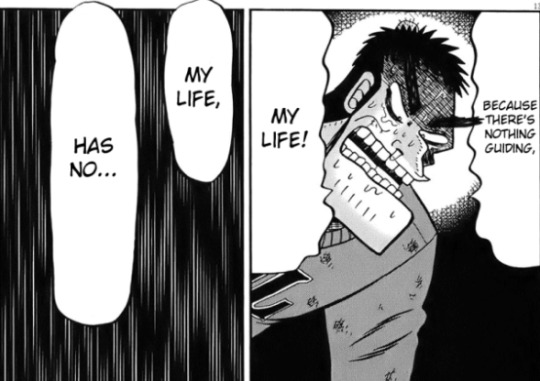
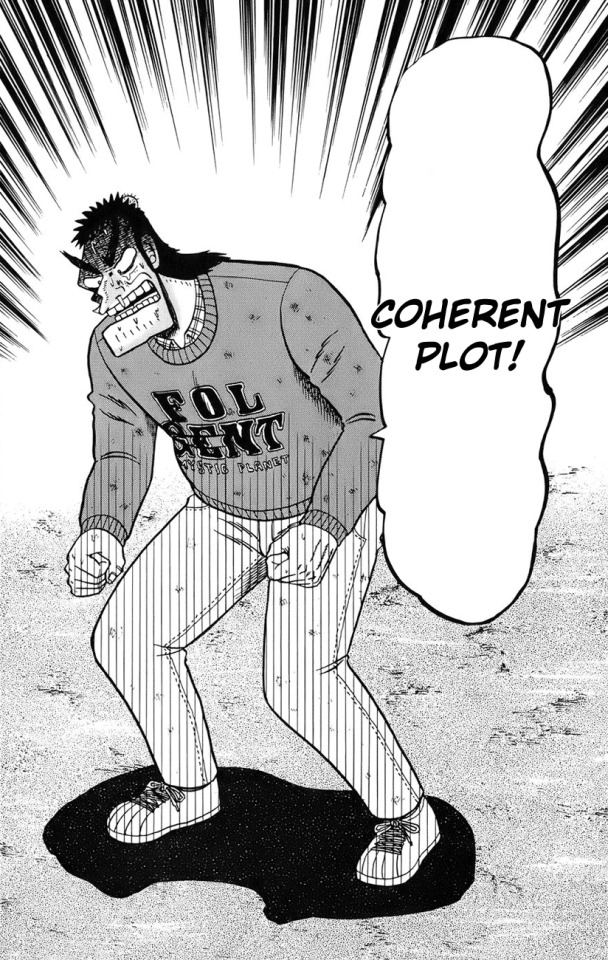
The quality of the chapters and different arcs is in my opinion rather uneven.
There are some really powerful scenes, notably the very end of the manga which is very touching. Kurosawa successfully leads a group of homeless men to defend themselves against some delinquents who were threatening them, but as a result of his injuries, he is implied to die. (The sequel manga reveals he actually just goes into coma for 8 years). It is bittersweet ending as he finally achieved something and is surrounded by human warmth.

Shin Kurosawa, the sequel, is similar to the first part, though slightly more light-hearted and focused on humor (even though Kurosawa’s situation technically worsens!). It seems to be less liked than the first part for those same reasons, but I personally enjoy Fukumoto’s humor and his more slice of life-y mangas. It has many genuinely funny moments. Once in a while there are still some chapters that feel deeper/more thought provoking, as Fukumoto likes to reflect about society, life, and humanity in his stories.
For anyone looking for other manga with similar themes, I can recommend Furuya Minoru’s excellent Wanitokagegisu . Both feature very lonely adult men who wish to turn their life around, and oscillate between humor and psychological drama.
4 notes
·
View notes
Text
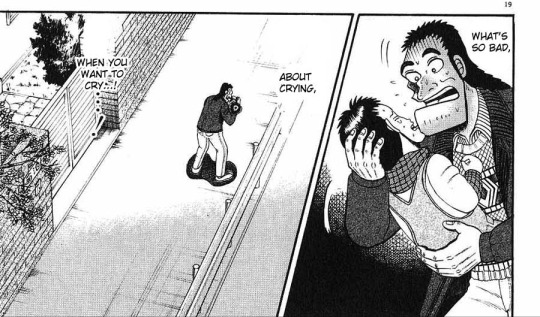
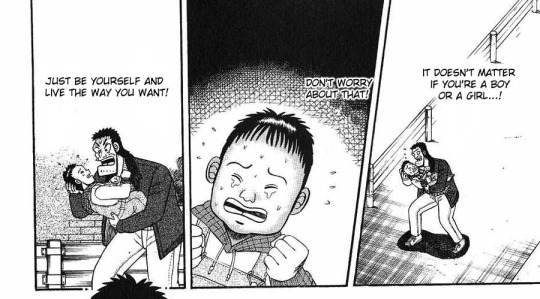
3 notes
·
View notes
Photo

2 notes
·
View notes
Photo

25 notes
·
View notes
Text
strongest man kurosawa
Very good. Nobuyuki Fukumoto demonstrates the depth of his empathy for the wildest characters with the deepest flaws, taking them to their extremes.
Kurosawa is a pathetic man in the eyes of society, and he’s wanted nothing more than to be liked. 45 years of failure at that hang heavy on his neck, and at the twilight of his life, when he thinks he can’t take it anymore, he finds himself unable to give up and surprises himself (and everyone else) with his will to survive. His aggressors escalate, and his tactics along with it. Emphasis on tactics - there’s no magic bullet or powerup arc for Kurosawa; a lifetime of construction work gives him hardiness, and a lack of options gives him the wild ideas that help him survive.
Story: 8/10. The beginning is practically misery porn. I almost had to drop it. I’m pretty bad at dealing with someone so pathetic being the main character - he’s a selfish dirtbag but he just doesn’t understand why. The first two volumes really set up his mindset and his approach. Once those are out of the way, though, things ramp up fast and the conflict is clear in each arc, and you’re just waiting to see what crazy shit Kurosawa comes up with only to be struck with the realization that it’s actually a surprisingly good idea. The story successfully made me take a character I hated and made me invested in his arc, as bittersweet as it was.
Art: 6/10. Fukumoto’s art is distinct and honestly not really suited to a manga where people fight. The art serves its purpose - faces are unique enough to be identifiable and the emotions are clear as day. I can’t even really fault the poses for being stiff, since most of these people aren’t good fighters in the first place. Anyway, the art isn’t the point, it’s just a delivery system. It’s competent at that and turns your attention to the other aspects of the storytelling instead.
Characters: 9/10. Fukumoto’s strength has always been his characterization. Kurosawa’s opening chapters had me question my own position in the world, and I had to take a moment to keep my impostor syndrome in check. The opening volumes are so painfully captivating that I got sucked in. No one’s as developed as Kurosawa is, but at the same time, there’s not a single named 1 dimensional character. Even better, they all serve to back up or contrast Kurosawa’s mentality. Does that make Kurosawa a fucked up Mary Sue? I don’t think so - even if everything is centered around him, it’s because his antics are so wild that it’s impossible to not notice him, even if the goal is to avoid him.
Overall: 8/10. I had the ending spoiled for me a long time ago and everybody talked it up, so I was braced for something that was very grand and would make me cry. It didn’t, but it rang a clear, uncomfortable note that made me feel for this miserable human being. The expectation soured the experience, unfortunately. That’s just my experience, though! Kurosawa’s story is worth the read, just for the crazy tactics alone. No matter how outnumbered or scared out of his wits he is, Kurosawa never gives up completely. It’s a story about a man with only one good trait. The story and characterization in particular made this another established Fukumoto work (one that’s done and everything!) that I’ve enjoyed.
#review#manga#strongest man kurosawa#saikyou densetsu kurosawa#recommended#these reviews are all too long
1 note
·
View note
Text
The New Kurosawa.
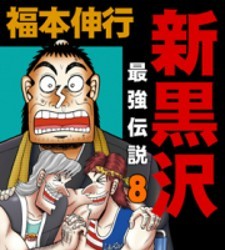
Alternative : 新黒沢 最強伝説 (Japanese); Shin Kurosawa; Shin Kurosawa - Saikyou Densetsu; The New Kurosawa: The Strongest Man; The New Kurosawa - Legend of the Strongest Man (English)
The New Kurosawa summary: After being knocked into a coma for the past 8 years due to the events of the previous series, Kurosawa slowly wakes up from his coma much to the shock of the doctors around him. Can he make the most of this second chance at life he's been given? #MangaFeeds.com, #ReadFreeMangaOnline MangaFeeds.Com: Read manga online the latest manga comic book, updated daily: https://mangafeeds.com/post/the-new-kurosawa_1587918756
Read more.
0 notes
Text
Happy to announce my dream project, only possible after embracing my gender
Saikyou Densetsu Kurosawa but Kurosawa is an Anime Girl.
0 notes
Text
Saikyou Densetsu Kurosawa.
Alternative: 最強伝説黒沢 ; Legend of the Strongest Man, Kurosawa ; Strongest Man Kurosawa ; The Legend of the Strongest Man
Description : 44 years old, single, working in a construction company for his entire life. All Kurosawa wants is a little respect from his co-workers. And a little popularity won't hurt. Unfortunately Kurosawa's plans fail miserably from time to time and one day, he finds himself right in the middle of a fight against...delinquent middle schoolers? #MangaReddit.com, #ReadFreeMangaOnline Read Free Manga Online at MangaReddit.com: https://mangareddit.com/p/saikyou-densetsu-kurosawa_1584399093.html
Read more.
0 notes
Photo

22 notes
·
View notes
Photo

10 notes
·
View notes
Photo

True slav Kurosawa
26 notes
·
View notes


